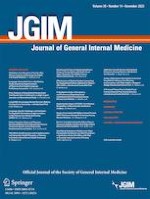Published in:

31-08-2023 | Telemedicine | Original Research: Qualitative Research
Language-Specific Challenges and Solutions for Equitable Telemedicine Implementation in the Primary Care Safety Net During COVID-19
Authors:
Anjana E. Sharma, MD, MAS, Sarah Lisker, BA, Jessica D. Fields, BA, Veenu Aulakh, MSPH, Kathleen Figoni, MS-HCA, Maggie E. Jones, MPH, Natasha B. Arora, MS, Urmimala Sarkar, MD, MPH, Courtney R. Lyles, PhD
Published in:
Journal of General Internal Medicine
|
Issue 14/2023
Login to get access
Abstract
Purpose
Telemedicine care dramatically expanded during the COVID-19 pandemic. We characterized facilitators and barriers to telemedicine implementation among safety-net primary care clinics serving patients with limited English proficiency (LEP).
Methods
We collected data on telemedicine volume and patient demographics among safety-net clinics participating in a telemedicine learning collaborative. Data on various metrics were reported to the collaborative from February 2019 through August 2021. We conducted semi-structured interviews with clinical and quality leaders, purposively sampling clinics serving high proportions of patients with LEP. We analyzed interviews with a mixed inductive-deductive approach applying the Consolidated Framework for Implementation Research.
Results
By September 2020, the 23 sites served 121,589 unique patients with in-person and 120,338 with telephone visits; 47% of these patients had LEP. Of 10,897 unique patients served by video visits, 38% had LEP. As a proportion of total visits, telemedicine (telephone and video) visits increased from 0–17% in October 2019–March 2020 to 10–98% in March–August 2020. We conducted 14 interviews at 11 sites. Themes included (1) existing telemedicine platforms and interpreter services were not optimized to support patients with LEP; (2) clinics invested significant labor iterating workflows; (3) sites with technological infrastructure and language-concordant staff were best suited to serve patients; (4) patients speaking less-represented languages or experiencing intersecting literacy barriers were underserved with telemedicine. Interviewees recommended innovations in telemedicine platforms and community-based access.
Conclusions
Safety-net sites relied on existing resources to accommodate patients with LEP, but struggled providing access for the most marginalized. Proactive, data-driven strategies to address patient and community barriers as well as optimize clinical workflows with high-quality, certified medical interpreters are needed to ensure equitable access.





